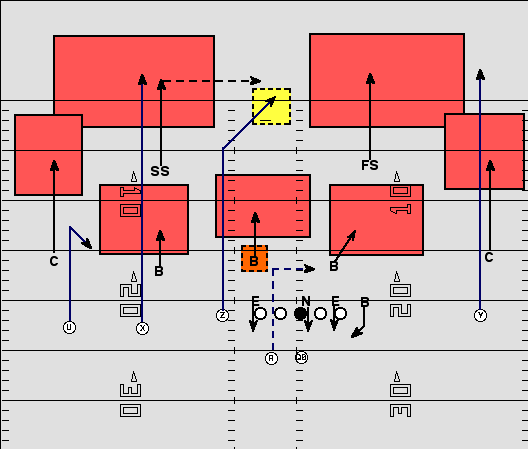
 In a recent article on NBC, Football Outsiders senior writer Mike Tanier wrote a piece on how the lockout might have a detrimental affect NFL offenses. (Picture taken from National Football Post, props to anyone who can figure out what play this diagram is showing) The reasoning is pretty simple, with less time to prepare and train players due to the lockout, playbooks and offensive philosophies that are considered “tricky” are going to be harder to execute than “simple” offenses and therefore put “tricky” offenses at a disadvantage.
In a recent article on NBC, Football Outsiders senior writer Mike Tanier wrote a piece on how the lockout might have a detrimental affect NFL offenses. (Picture taken from National Football Post, props to anyone who can figure out what play this diagram is showing) The reasoning is pretty simple, with less time to prepare and train players due to the lockout, playbooks and offensive philosophies that are considered “tricky” are going to be harder to execute than “simple” offenses and therefore put “tricky” offenses at a disadvantage.
I respect Tanier’s work and I think Football outsiders is one of the best football websites out there, but this article had me scratching my head a little. The implicit suggestion of this article is that if a team utilizes a “tricky” offense they should consider dumbing it down to account for the lockout.
To me this seems a little bit ridiculous, teams spend years building an identity and to throw it out the window for one year sounds like a decidedly bad idea. Should the Packers take the ball out of Aaron Rodgers hands and start calling more running plays? That’s not who the Packers are and it definitely wouldn’t work for them. That’s like asking the Tennessee Titans (who Tanier uses for comparison for the Packers), to take the ball away from Chris Johnson and give it to (insert quarterback here).
To me the inherent flaw in this piece is that ”tricky” plays are inherently complex and that complexity is handled the same for each team.
- Personnel factor heavily on the play selection: All teams try to maximize the strength of their players while mitigating their weaknesses. For the Titans, this means running the ball and for the Packers this means throwing the ball. You can bet that if the Titans had Aaron Rodgers they would throw it more or if the Packers had Chris Johnson they would run it more. Simply put, the Packers are built to run a more “tricky” offense, but that also means that they are better suited to run “tricky” plays.
- Above all, the quarterback determines the limit of “trickiness”: The quality of a quarterback can mitigate many positional deficiencies on the offense, but the quality of a quarterback also determines how “tricky” an offense can get. The Titans are a mess at quarterback at the moment, they’ve announced that former starter Vince Young will no longer be on the team and Kerry Collins is not lock to make it back either. The team also drafted Jake Locker in the 1st round, who is considered talented but raw at this moment (and is a rookie quarterback to top it off). It’s pretty obvious that the Titans are going to try to limit the damage of an inexperienced/ineffective quarterback by relying on its running game and defense. On the other hand, the Packers have Aaron Rodgers, who might be the best quarterback in the NFL at the moment, and actually taking away “tricky” plays would likely hurt Rodgers’ production.
- A poorly run “tricky” play may net better results than a well run “simple” play: Due to its complexity, passing play usually allow for more improvising than running plays; how many times has Aaron Rodgers escaped the pocket after getting no help from his offensive line and adlibbed a throw to a wide receiver who broke off his route to get open for his quarterback? I would venture a couple times a game. How many times does Chris Johnson get beautiful blocking from his offensive line and receivers and gain next to nothing? I would again venture a couple times a game. Simply put a broken “tricky” pass play can often yield better results than a perfect “simple” run play based on the fact that the average passing play nets more yards than the average running play; so even if a passing play wasn’t run perfectly, it’s still possible for it to have gained more yardage than a perfect running play.
- Organization stability allows teams to get away with more “trickiness”: Everyone has to start somewhere, and usually that means start simple. The Titans have overhauled their coaching staff this offseason by firing head coach Jeff Fisher, formerly the longest tenured coach in the NFL, with first time head coach Mike Munchak. Undoubtedly Munchak would like to install his own playbook and offensive philosophy (that is after all why he was chosen after all), which causes two problems. For one, having to teach the entire team a new playbook is daunting enough on its own but factoring in the lockout and it may be near impossible. Secondly, the players that the Titans currently have under contract are based on Jeff Fishers offensive philosophy and may not fit into Munchak’s philosophy. On the other hand, the Packers essentially kept their entire coaching staff intact and after winning a Super Bowl, its highly unlikely that the Packers would be doing anything drastic to the offense. So in essence, it isn’t that the Packers are more “tricky” than the Titans, it’s that the Packers can get away with more complex plays due the familiarity that the coaches and players have with the offense.
- What is “tricky” for one team is “simple” for another: Going back to offensive philosophy, some teams utilize certain plays more and therefore are better suited to running them without as much practice. For instance, the Packers employed empty backfield formations quite often, and therefore should have less trouble “re-learning” those plays due to the high amount of time spent practicing and using those plays last year. On the other hand, the Packers aren’t incredibly adept at using screen plays and don’t use them all that often either (which is why its even more surprising when it ends up working). On the other hand, the Denver Broncos use screens as an integral part of their offense but don’t use empty backfield sets nearly as much as the Packers. In other words, the Packers will have an easier time with using empty backfield plays while having more trouble with screens but this will be reversed for the Broncos.
- On the flip side, defenses will also have less time to prepare for “tricky” plays: even if teams are going to have difficulty learning “tricky” plays, the defense are going to have the same difficulty accounting for “tricky” plays. Just as “crazy personnel groupings and formation shifts cannot be easy to master on a tight deadline”, so will be defending against these types of plays. Furthermore, going under Tanier’s statement that the simplest play is the basic running play, defending against the basic running play is also going to be the simplest, so in essence the offense gains no competitive advantage by using a “simple” play instead of a “tricky” play.
I think the take home message is that “tricky” plays don’t inherently mean complex to learn or execute and what is “tricky” is defined by the team. What play a team decides to call has a lot to do with their offensive philosophy and player personnel; for teams that are suited to run “tricky” plays, these plays aren’t going to be that complex as they are for a team that isn’t as suited to run “tricky” plays.
——————
Thomas Hobbes is a staff writer for Jersey Al’s AllGreenBayPackers.com.
——————

Thomas – couldn’t agree more. All the Packers have to do is use last year’s playbook until there is an opportunity to add new wrinkles. The lack of major player turnover (so far) should bode well for continued consistency.
I read Tanier’s article and lets just say that some writers are handling the lockout better than others.
My personal feeling is that consistency is going to trump everything else, teams who are consistent in their approach will have an easier time with the lockout than teams that aren’t. In particular, teams that are constantly switching back and forth between 3-4 and 4-3 schemes (I’m not talking about hybrid defenses) are going to be a total diaster after the lockout.
agreed. going five wide is not tricky for the packers. it is a staple of their offense. the WRs other than cobb may be the most experienced unit on the team. MM may not be able to use as many personnel groupings early in the year, but the packers offense took off last year after MM got back to what the packers do well. i think the article was searching for something and it may apply to some teams with more inexperience, but it will not affect the packers hardly at all.
but good luck to teams with new coaches. they could be a mess.
brandt and clayton think mid july is a realistic timeline for getting the lockout settled. i think clayton is a moron and talks out of his arse, but i respect andrew brandt and would imagine he has some pretty good sources in ownership.
Andrew Brandt may be one of my favorite analysts. The only thing about Andrew Brandt is this; he is an optimist. He has been on the wrong end of prediction all along the way, basically because he is trying to be the voice of hope. I respect him for that, but at the same time, don’t put too much credence into the prediction.
I think the play is diagramming how to beat a Quarters or Cover 4 Defense with a tight end in the seam between the safeties and behind the MLB
Actually, I believe the play is the Greg Jennings TD catch in the Super Bowl.
Wow that was fast, this is indeed the “AAAAhhh I feel him all over here :D” TD catch by Greg Jennings against the Steelers in the Super Bowl.
Jersey Al is correct as usual. It even shows the SS (Pileofpoopoo) coming over late from his zone.
It was interesting to hear Mike McCarthy on G&G Today explain how that play pictured above was a “basic play,” and it came down to Rodgers and Jennings beating the coverage.
I agree with your article. Being “tricky” doesn’t automatically imply complexity. We’ve heard McCarthy talk on and on about “fundamentals,” and I think he not only bases player technique on that, he also bases his offense on that. The players are doing fundamental things, but he utilizes their versatility in optimal ways.
Plus, as you noted, a lot of these guys on the offense are veterans and are comfortable in the system. Training camp is pretty much the time to shake off the rust for a lot of them.